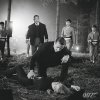Dumarest
Vaquero de Alta California
- Joined
- Jan 20, 2018
- Messages
- 15,721
- Reaction score
- 34,465
It may or may not be common knowledge, but Victory Games, the publisher of James Bond 007: Role Playing in Her Majesty's Secret Service (© 1983), evolved out of Avalon Hill hiring design staff from SPI after TSR bought out (and proceeded to dismember) SPI. The rulebook is divided into a Player Section of about 90 pages and a Gamesmaster Section of about 60 pages (including a short adventure entitled The Island of Dr. No).
The Player Section leads off with Chapter 1: Introduction, which opens with a short, one-paragraph explanation of what roleplaying is, and then continues with Role Playing in the World of James Bond. The world wherein the game takes place is "certainly close to our own world, but a bit more fantastical. The men are always handsome, the women always beautiful, and the villains always evil. It is a world of luxurious cars and breathtaking locations in which the good guys always win (or at least break even)."
With regard to those assertions, if the novels of Ian Fleming and movies produced by Albert Broccoli aren't your cup of tea but you still want to play secret agents, there is absolutely nothing stopping you from modeling your game after a grittier and more realistic secret agent world along the lines of Edward S. Aarons' Assignment series instead.
Then there are the usual explanations of terms like Player Characters and Gamesmaster and Non-Player Characters and what their roles are within the game, which nobody reading this forum will need to have explained.
Fans of James Bond are duly advised that (1) where there is a conflict between the books and the movies, the game will lean toward the movies, and (2) "due to certain contractual agreements" they couldn't use SPECTRE or Ernst Stavro Blofeld or, indeed, even mention them by name.
The Note for Experienced Role Players informs us that, unlike most RPGs, in which the GM is all-powerful and the PCs may have little influence in their world, in James Bond 007 the rules are supposedly designed to favor the players and their characters will generally be more competent than NPCs. Personally I don't think that's the case as there is nothing to tie a GM's hands. However, the author notes that there is no guarantee that the players will be successful and that much depends on their abilities to play well. The main thing the PCs will have in their favor is Hero Points, which can be used to affect outcomes, while the bad guys only get Survival Points, which cannot be used offensively. You can eliminate both if you want a grittier game where the PCs are more likely to fail in a sticky wicket and the villains stand or fall based solely on the actions of the players and the luck of the dice. But we don't discuss either of those until Chapter 9: Hero Points. Additionally, it is noted that although the characters are agents of M.I.6, they will largely be on their own and should be discouraged from trying to get assistance or instructions from M or headquarters once they are out in the field, and that it will sometimes be necessary for the PCs to make independent decisions when their original orders no longer apply due to changing circumstances.
Materials of Role Playing is merely a catalogue of what is necessary, and what might be nice to have, the play the game. I love it when the author feels the need to tell you that you need a copy of the rules. Assuming you didn't forget to acquire the rulebook, you'll also need two six-sided and two ten-sided dice so you can make the d6, d10, d100, and Xd6 rolls necessary to play the game. You'll also want some pencils so you can write things down. It's also suggested that you can use graph paper and figures or markers to keep track of where everyone is during chases or gun fights, but none of that is necessary. At the back of the book there's a nice character sheet you can photocopy; it includes a multiplication table for fast lookup of your Success Chance (i.e., what you need to roll ≤ to succeed) with various combinations of Primary Chance and Ease Factor. What are Primary Chance and Ease Factor? We'll come to that.
I'm going to skip over the Glossary of Terms because I'll be explaining them as they come up.
(Next: Game Concepts, or "What are Success Chance, Primary Chance, Ease Factor, and Quality Rating?")
The Player Section leads off with Chapter 1: Introduction, which opens with a short, one-paragraph explanation of what roleplaying is, and then continues with Role Playing in the World of James Bond. The world wherein the game takes place is "certainly close to our own world, but a bit more fantastical. The men are always handsome, the women always beautiful, and the villains always evil. It is a world of luxurious cars and breathtaking locations in which the good guys always win (or at least break even)."
With regard to those assertions, if the novels of Ian Fleming and movies produced by Albert Broccoli aren't your cup of tea but you still want to play secret agents, there is absolutely nothing stopping you from modeling your game after a grittier and more realistic secret agent world along the lines of Edward S. Aarons' Assignment series instead.
Then there are the usual explanations of terms like Player Characters and Gamesmaster and Non-Player Characters and what their roles are within the game, which nobody reading this forum will need to have explained.
Fans of James Bond are duly advised that (1) where there is a conflict between the books and the movies, the game will lean toward the movies, and (2) "due to certain contractual agreements" they couldn't use SPECTRE or Ernst Stavro Blofeld or, indeed, even mention them by name.
The Note for Experienced Role Players informs us that, unlike most RPGs, in which the GM is all-powerful and the PCs may have little influence in their world, in James Bond 007 the rules are supposedly designed to favor the players and their characters will generally be more competent than NPCs. Personally I don't think that's the case as there is nothing to tie a GM's hands. However, the author notes that there is no guarantee that the players will be successful and that much depends on their abilities to play well. The main thing the PCs will have in their favor is Hero Points, which can be used to affect outcomes, while the bad guys only get Survival Points, which cannot be used offensively. You can eliminate both if you want a grittier game where the PCs are more likely to fail in a sticky wicket and the villains stand or fall based solely on the actions of the players and the luck of the dice. But we don't discuss either of those until Chapter 9: Hero Points. Additionally, it is noted that although the characters are agents of M.I.6, they will largely be on their own and should be discouraged from trying to get assistance or instructions from M or headquarters once they are out in the field, and that it will sometimes be necessary for the PCs to make independent decisions when their original orders no longer apply due to changing circumstances.
Materials of Role Playing is merely a catalogue of what is necessary, and what might be nice to have, the play the game. I love it when the author feels the need to tell you that you need a copy of the rules. Assuming you didn't forget to acquire the rulebook, you'll also need two six-sided and two ten-sided dice so you can make the d6, d10, d100, and Xd6 rolls necessary to play the game. You'll also want some pencils so you can write things down. It's also suggested that you can use graph paper and figures or markers to keep track of where everyone is during chases or gun fights, but none of that is necessary. At the back of the book there's a nice character sheet you can photocopy; it includes a multiplication table for fast lookup of your Success Chance (i.e., what you need to roll ≤ to succeed) with various combinations of Primary Chance and Ease Factor. What are Primary Chance and Ease Factor? We'll come to that.
I'm going to skip over the Glossary of Terms because I'll be explaining them as they come up.
(Next: Game Concepts, or "What are Success Chance, Primary Chance, Ease Factor, and Quality Rating?")
Last edited:
















































